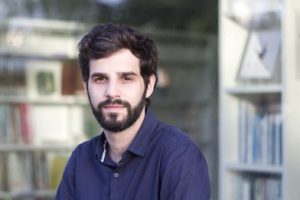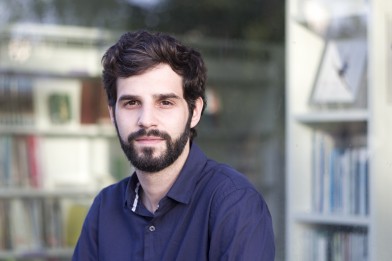
Assistant Professor Pedro Miguel Cruz
The 2016 London Design Biennale was an event that was the first of its kind. Artists from across the world, each representing their respective home countries, came together to produce art exhibits centered around the theme “Utopia by Design.” Inspired by the 500th anniversary of Thomas More’s Utopia, each team of artists, designers and curators was tasked with coming up with and creating a piece that they felt embodied the theme. Amongst those was Dr. Pedro Miguel Cruz, Assistant Professor in Information Visualization in Northeastern University’s College of Arts, Media and Design.
Representing his native country of Portugal, Cruz served as a lead designer for the nation’s exhibit. Entitled “UN/BIASED,” the piece featured four differently designed information maps to visualize data trends related to sexism in Portugal. The first two maps were computer-generated. Depicting dystopian futures, “Salary” and “Migrants” both depicted downward trends. They were offset by two physical, biological maps crafted out of natural agents such as plants and bacteria. By using natural elements that Cruz referred to as “agents of change,” the biological maps created a more optimistic, utopian future based off of socio-economic factors demonstrating improvement in Portugal.

Screenshot from “Salary,” Pedro Cruz, 2016
Unlike many other exhibitors at the Biennale, Cruz and his team, artist Marta de Menezes and curator Manuel Lima, did not want to focus on what the exact definition of utopia is, or how such a state of being may be achieved. Instead, the team wanted to create an exhibit that would directly contrast utopia and dystopia. Cruz explained the concept of Utopia in the piece as being “defined by making a counter-point on the things that are not so well.” Instead of handcrafting a vision of improved society, Cruz and his companions chose to show the ways in which existing downward trends can be offset by improvement – such improvement is the benchmark of utopia.
With Cruz’s background lying solely in design, all three primary members of Portugal’s team brought an individual approach to executing the piece. Following Lima’s lead, Cruz and Menezes worked in different ways to bring the idea to life. Cruz described he and Menezes as having “similar aesthetic sensibilities.”
“Acting at the intersection of art and design considers the clarity of communication, the expressiveness of the piece and its shocking value, and the awareness and questioning that it aims to provoke,” Cruz explained.

“UN/BIASED,” Image Courtesy of Ed Reeves
Cruz himself is used to design coming to “intersections” with other areas of study. Cruz initially began his higher education in engineering physics. During that time, however, Cruz developed interests in traditional design (by way of typography, posters, etc.) and programming. Self-described as having limited drawing or crafting skills, Cruz soon discovered that he could utilize programming as his “brushes.” This led him to his current career in information and data visualization, as well as his current position here at Northeastern.
“The MFA in Information Design and Visualization here at Northeastern is a great program here that really enables students to explore their own paths inside the field,” Cruz explained. “We push the students to reflect on the current state of visualization approaches and to push them forward; they are all very much eager to pursue these exploratory paths. That is what really drives me.”


